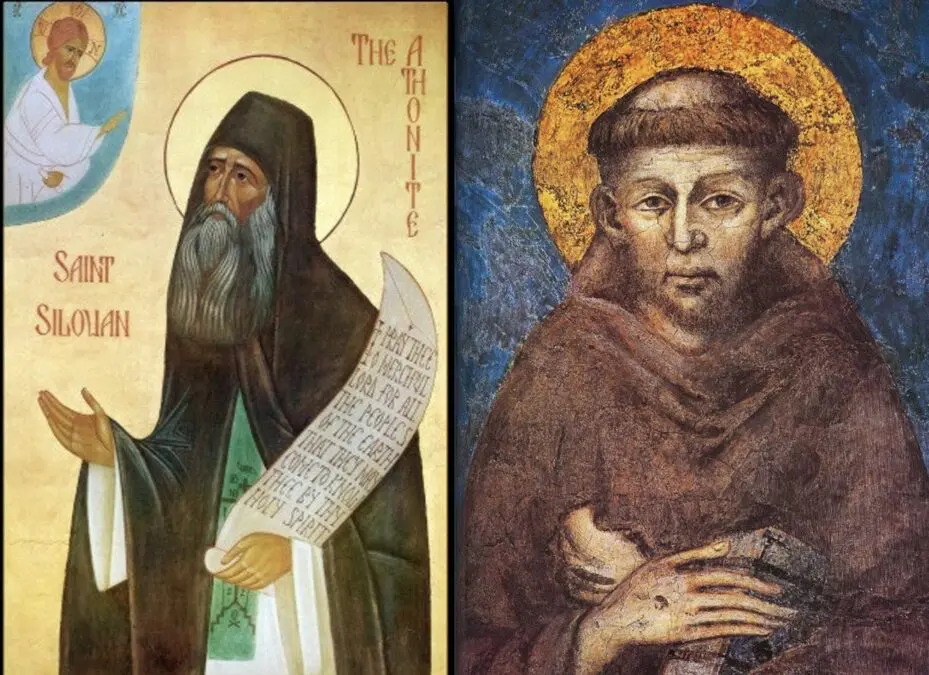During the recent ecumenical meeting of “Synaxis” in Romania, on the theme “Blessed are the peacemakers”, the witness of certain figures was explored in greater depth. Here are two inspiring witnesses for today’s Church, one from the West, the other from the East.
by Martin Hoegger, www.hoegger.org
Maurizio Bevilacqua, a Claretian and specialist in consecrated life (Rome), reflects on forgiveness and peace in the light of Francis of Assisi’s famous “Canticle of Brother Sun”. He notes that it is easy to give this text an aesthetic or romantic interpretation, but this does not correspond to Francis’ intention. In fact, in 1225, when he wrote this song, Francis was almost blind and ill, and died the following year.
In fact, we need to highlight the centrality of Francis’ spiritual quest. For him, the experience of fraternity and living together is fundamental: in Christ, we are all brothers and sisters, all equal.
Towards the end of his life, he suffered greatly from the lack of love between the governor (the “podestat”) of the city of Assisi and the bishop. “It is a great shame that no one is trying to restore peace and harmony between them,” he wrote. It was then, two months before his death, that he added the stanza on forgiveness:
“Be praised, my Lord, through those who forgive for love of you; through those who endure sickness and trial. Happy those who endure in peace, for by you, Most High, they will be crowned.”
M. Bevilacqua gives an interpretation of this verse. If Francis left the world, it was to be fraternal towards everyone. He could not accept that the State and the Church should hate each other.
Francis is convinced that reconciliation requires above all the ability to forgive. But he does not hide the fact that forgiveness can involve tribulations. The path of the Gospel has never been a guarantee of tranquility and human success.
Why did Francis want to introduce the theme of forgiveness into this hymn? To perceive a profound harmony between the praise of creatures and the praise of forgiveness! He calls for a universal brotherhood that excludes no one and includes creation.
Sister Magdalen, from the Monastery of Saint John the Baptist (Essex, England), introduced us to the spirituality of Saint Silouane, a monk from Mount Athos who died in 1938, and who lived the beatitude of peace by teaching and living love of enemies.
Saint Sophrony, a disciple of Saint Silouane, reminds us that “those who truly preach the peace of Christ must never lose sight of Golgotha… This is why the true Church that lives love of enemies will always be persecuted.”
It is the Holy Spirit who teaches us to love our enemies and to pray for them so that they may be saved. Silouane prayed every night. His main prayer was that all the peoples of the world would welcome the Holy Spirit and be saved. He concentrated on what was essential: salvation.
He knew that even in a Christian community there can be hostility. To have peace in our souls, we have to get used to loving the person who has offended us and praying for him or her immediately.
As a novice, Silouane saw Christ in a vision, who taught him to love his enemies. From then on, he wanted to imitate Christ, who prayed for those who had crucified him.
For Silouane, love of enemies is the criterion for verifying the reality and depth of our love for God. He who refuses to love his enemies will not know the Lord.
Love of enemies is also an ecclesiological criterion: the persecuted Church that prays for its enemies is the true Church, rather than the Church that organizes uprisings and even wars against the enemies of the truth.
Silouane shows us that, whatever the external situation, inner peace is preserved if we cling to God’s will.
However, peace is not always possible because of the human tendency for domination or revenge. But those who believe in the Resurrection never give up their work for peace.
Silouane sees a link between peace, love of enemies and humility. “The soul of the humble man is like the sea; if you throw a stone into the sea, it clouds the surface of the waters for a moment, then sinks into the depths. If we lose our peace, we must repent to find it again.
Silouane proposes a rich theology of “synergy”: grace increases when we bless those who curse us, but he is also aware that we can only love our enemies by the grace of the Holy Spirit.
S. Magdalen ends her rich presentation with this prayer by Silouane, which expresses his spirituality very well:
“Lord, teach us by your Holy Spirit to love our enemies and to pray for them with tears. Lord, pour out the Holy Spirit over the earth so that all peoples may know you and learn of your love. Lord, as you prayed for your enemies, so teach us too, through the Holy Spirit, to love our enemies”.
For other articles on this theme, see: https://www.hoegger.org/article/blessed-are-the-peacemakers/
Illustration: Francis of Assisi and Silouane of Mount Athos.







